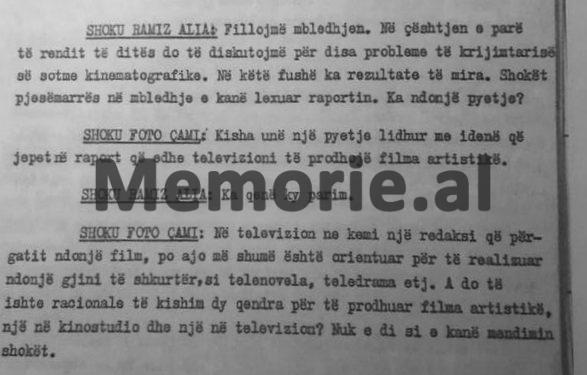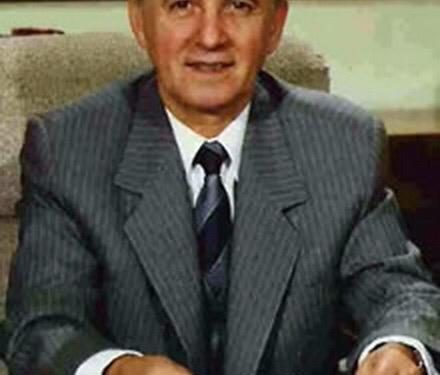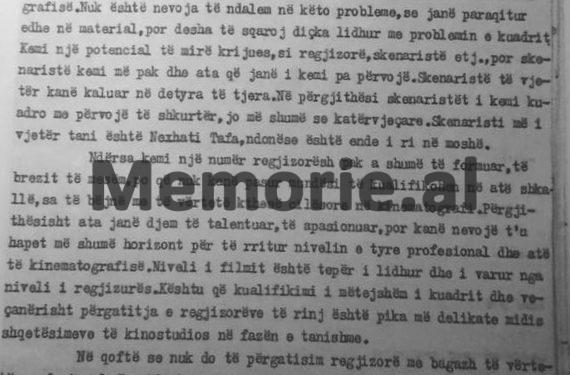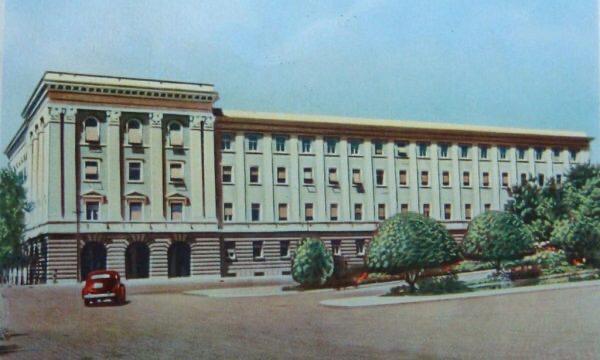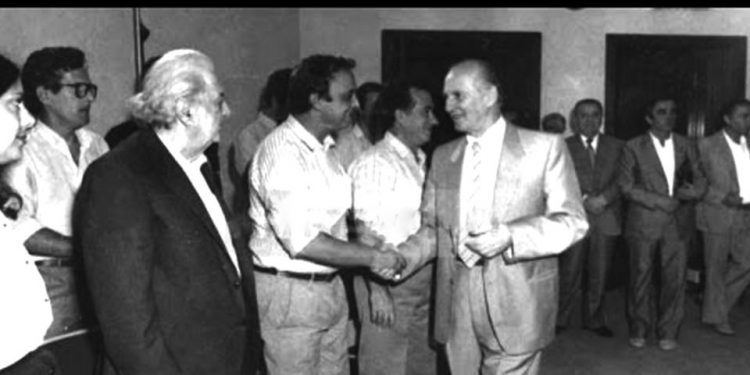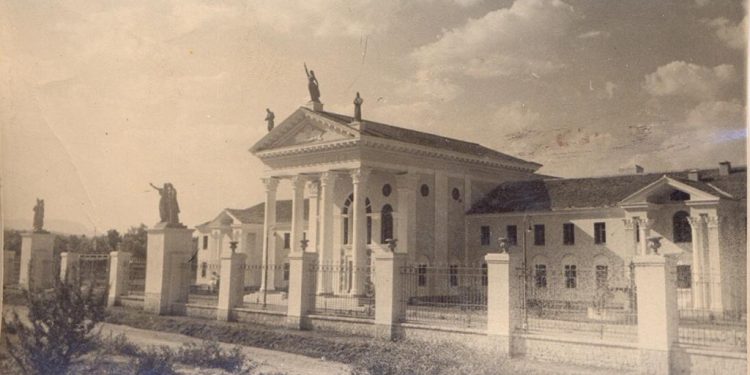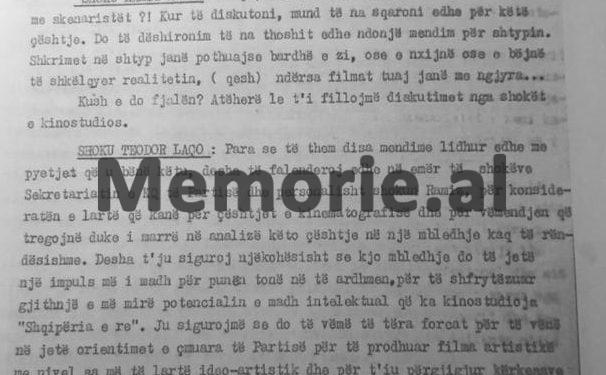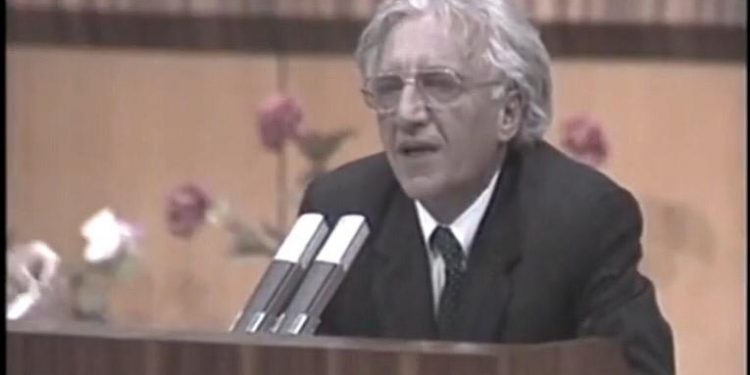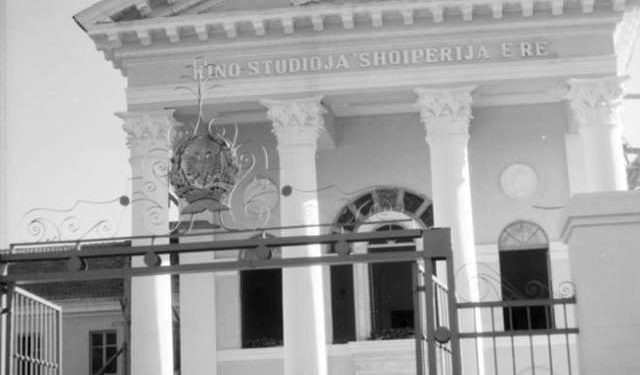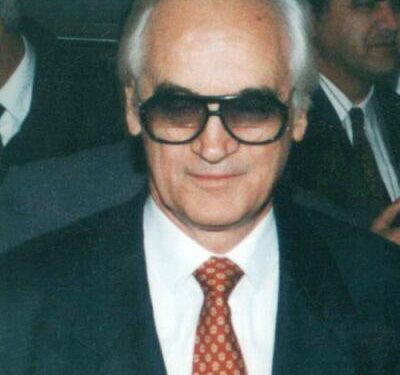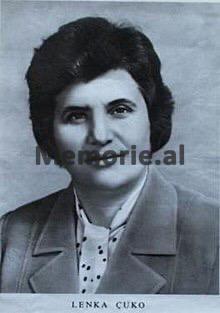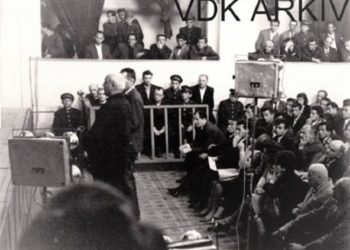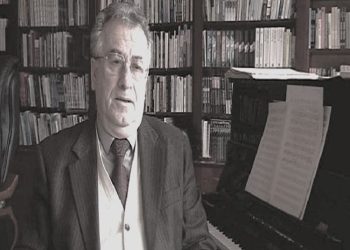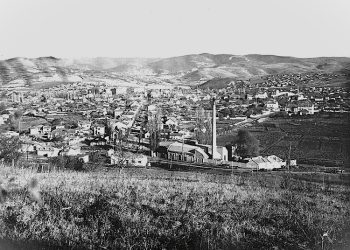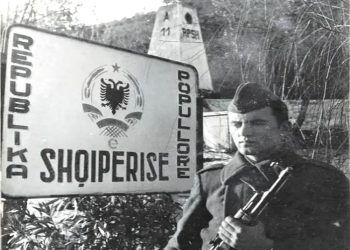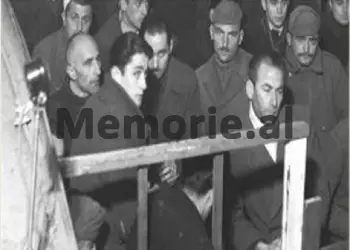Dashnor Kaloçi
Memorie.al publishes some archival documents taken from the Central State Archive in Tirana (fund of the former Central Committee of the ALP), belonging to 1990, where there is a record of the meeting of the secretariat of the Central Committee of the ALP which, as the main item on the agenda, had “on some issues of today’s cinematic creativity” and in that meeting which was chaired by the First Secretary of the Central Committee of the ALP and the Chairman of the Presidium of the People’s Assembly of The People’s Socialist Republic of Albania, Ramiz Alia, in addition to the secretaries of the Central Committee such as: Foto Çami, Hekuran Isai and Lenka Çuko, also participated some of the highest officials of the party and state leadership of that time, such as: Spiro Dede, Abdyl Backa , Ali Vukatana, Sotir Koçollari, Alfred Uçi, Dritëro Agolli, Lisen Bashkurti, Skënder Gjinushi, Neritan Babamusta, Dhimitër Shandro, Marash Hajati etc. The full minutes of the meeting with conversations and discussions between Ramiz Alia and the senior party and state leadership of that time, with the main leaders from the creative sector of Kinostudio “Shqipëria e Re”, such as: Teodor Laço, Dhimitër Anagnosti and Nexhati Tafa, who dwelled at length on the problems of Albanian cinematography.
“Both ways seem to be rational and useful. Complete studies are also necessary, e.g. students of the directing branch at the Higher Institute of Arts, can study for directing after finishing 3-4 years of school. In general, and in other parts of the world, directors prepare after graduating from high school. Directing studies are a second school for them. In many cases, those who prepare for directing do not go to the faculties of drama or directing, but to other faculties, especially the faculties of literature. We have not practiced this until today, but with those of the director, because at the present time usually the director of the film is also the author or co-author of the screenplay. This would be one way of full professional preparation. The second way is to prepare the staff we have with postgraduate courses with a short period of 1 year for directing. For example, this year we successfully closed a postgraduate course with 4 students of directing, who made two good films. To prepare for the first road we sent a student to France who will study 4 years of directing. However, he is the only one and, in my opinion, seeing the demands that Kinostudio has today, it is very little …!”
This was stated, among other things, in his speech at one of the meetings of the secretariat of the Central Committee of the ALP of 1990, Teodor Laço, then head of the script editorial office at the Kinostudio “Shqipëria e Re”, a meeting on “Some issues of today’s cinematographic creativity ”, which was chaired by the First Secretary of the Central Committee of the ALP and the Chairman of the Presidium of the People’s Assembly of the People’s Socialist Republic of Albania, Ramiz Alia, where in addition to other secretaries of the Central Committee, as Photo Çami, Lenka Çuko and Hekuran Isai, were also present in most of the senior party and state leadership of that time that had direct or indirect connections with art and culture. For more than what was discussed in that meeting where besides Teodor Laços, from Kinostudio “Shqipëria e Re”, participated also the director Dhimitër Anagnosti and the screenwriter, Nexhati Tafa, the document in question introduces us to the minutes of that meeting, which Memorie .al publishes it in full and for the first time, starting from this number.
Minutes of the meeting of the Secretariat of the Central Committee of the ALP, with the staff of the creative sector of Kinostudio “Shqipëria e Re”
In this meeting participate the secretaries of the Central Committee of the ALP, friends: Foto Çami, Hekuran Isai and Lenka Çuko.
Participating as guests for the first issue are also comrades: Alfred Uçi, Chairman of the Culture and Arts Committee, Dritëro Agolli, member of the Central Committee of the Party and Chairman of the Writers and Artists Association, as well as comrades Dhimitër Anagnosti and Nexhati Tafa, directors at Kinostudio “Shqipëria e Re”, and Teodor Laço, head of the editorial staff of film scripts at Kinostudio “Shqipëria e Re”.
Comrade Spiro Dede, candidate of the Central Committee of the Party and assistant to the first secretary of the Central Committee of the Party, participates from the apparatus of the Central Committee of the Party.
During the discussion of the second and third issue, only comrade Dritëro Agolli participates as a guest.
In the discussion of the fourth issue, participate comrades: Sotir Koçollari, member of the Central Committee of the Party and President of the General Council of Professional Unions of Albania, Ali Vukatana, member of the Central Committee of the Party and Chairman of the Committee of the General Council of The Union of Fitnessists and Athletes of Albania, Lisen Bashkuri, First Secretary of the Central Committee of the Union of Working Youth of Albania, Skënder Gjinmushi, Minister of Education of the Socialist People’s Republic of Albania.
Comrade Neritan Babamusta, instructor in the education and culture sector, participates from the apparatus of the Central Committee of the Party.
Comrade Dhimitër Shandro, head of the statute department in the apparatus of the Central Committee of the Party, participates as a guest in the discussion of the fifth issue.
The regular guests also attend the meeting: comrades Marash Hajati, member of the Central Committee of the Party and editor-in-chief of the newspaper “Zeri i Popullit”, Abdyl Backa, candidate of the Central Committee of the Party and assistant to the first secretary of the Central Committee of the Party.
MEETING DEVELOPMENT
COMRADE RAMIZ ALIA: We start the meeting. In the first issue of the agenda, we will discuss some issues of today’s cinematic creativity. There are good results in this area. Fellow attendees read the report. Any questions?
COMRADE PHOTO ÇAMI: I had a question about the idea given in the report, that our television also produces feature films.
COMRADE RAMIZ ALIA: That was the principle.
SHOKU FOTO ÇAMI: On television we have a redkasi who prepares a film, but it is more oriented to make a short film, such as soap opera, teledrama, etc. Would it be rational to have two centers to produce feature films, one in the film studio and one on television? I do not know how friends think.
COMRADE RAMIZ ALIA: The report expressed concern about the difficulties encountered in finding cinematographic actors. How do you plan to solve this problem?
I had another question, to which Dritëroi, Alfredi or Teodori can answer: Have you draw any conclusions from the decision of the 9th Plenum of the Central Committee of the Party, regarding the rules for approving screenplays for films, etc., or will we continue with the old methods? Is there a good working collaboration between the directors and the screenwriting editors, or between this editorial staff and the screenwriters?
COMRADE DHIMITËR ANAGNOSTI: We agree with the screenwriting editors and resolve the concerns inside the film studio.
COMRADE RAMIZ ALIA: What problem do you, Teodor, have in cooperation with the screenwriters? When you discuss, you can also explain to us about this issue. Would you like to tell us some thoughts about the press as well? Press writing is almost black and white, or it darkens, or it makes reality brilliant (laughs), while movies are in color film
Who loves the word? Then, let the discussions from the fellow film studio begin.
COMRADE TEODOR LAÇO: Before saying some thoughts on the questions that were asked here, I would also like to thank on behalf of the comrades, the Secretary of the Central Committee of the Party and personally Comrade Ramiz, for their high consideration for the issues of cinematography and the attention they show by taking these issues into account in such an important meeting. At the same time, I wanted to assure you that this meeting will be a greater impulse in our work for the future, to make better and more use of the great intellectual potential that the “New Albania” film studio has. We assure you that we will do our best to implement the precious orientations of the Party to produce feature films at the highest possible ideo-artistic level and to respond to the demands of the time.
We will implement the decisions of this meeting of the Secretariat of the Central Committee of the Party as well as possible and we will definitely realize a qualitative turn in cinematography.
For all the successes that have been achieved, we are aware that we have a lot to do. We are now in a delicate moment of the development of cinematography, in a moment when we have to think a lot and make a qualitative turn, especially in terms of deepening the realization of our films, of addressing the acute and important problems of society, of great philosophical messages that must permeate cinematography.
We think that there are two main key problems that cinematography has today, which would condition this qualitative turn:
- Thematic orientations that we do not lack. We more or less know them.
- The problem of the creative framework and the technical basis of cinematography. There is no need to dwell on these problems because they are also presented in the material, but I wanted to clarify something related to the staffing problem. We have a good creative potential, as directors, screenwriters, etc., but we have few screenwriters and those we have are inexperienced. Older screenwriters have moved on to other tasks. We generally have screenwriters with short experience, no more than four years. The oldest screenwriter is now Nexhati Tafa, although he is still young.
While we have a number of more or less trained directors, of the middle generation, but who have not had the opportunity to qualify to that degree as they really make a qualitative turn in cinematography. They are generally talented, passionate guys, but they need more horizons to increase their professional level and that of cinematography. The level of the film is highly related and dependent on the level of directing. So, the further qualification of the staff, and especially the preparation of new directors, is the most delicate point among the concerns of the film studio at the present stage.
If we do not prepare directors with real professional and ideological baggage, cinematography will remain at these levels it has today. We want and aim to have directors from the point of view of mastery and professional skills, to surpass even the best directors we have today, such as Dhimitër Anagnosti, etc.
COMRADE RAMIZ ALIA: (Laughs). Demetrius does not let them pass, he will move forward.
COMRADE TEODOR LAÇO: I wanted to add that the preparation of new directors is a very urgent problem, because most of the previous directors meet the retirement age.
The path that has been followed so far for the preparation of directors, bore fruit, although it is a rather empirical path. So far, the directors have dealt with the cadres that have emerged from the Higher Institute of Arts. They graduated in acting, worked for a long time as assistant directors, and were eventually entrusted with shooting a film. To some extent this has been a practical way in choosing the preparation of directors, but it is not adequately clothed even with the necessary theoretical baggage. In many cases, the absorption of the necessary professional experience on a theoretical and scientific basis has been lacking, and especially it would ensure a high quality of the film.
Therefore, we think that the problems of the qualification of the staff, of the preparation of the directors, are before us.
COMRADE RAMIZ ALIA: Our film studio has a very good experience in preparing directors and operators. Most of our directors have been operators before… You, Theodor, are crazy about this issue.
COMRADE DHIMITËR ANGANOSDTI: That’s right. Three of our best directors have been cameramen.
COMRADE RAMIZ ALIA: It seems to me that the directors prepared with school, we only had two…?
COMRADE DHIMITËR ANGANOSTI: That’s right. Then three more were added who had been cameramen, and the directors who came later, were prepared in the film studio. I also agree with the opinion of Comrade Teodor, that the demands for a qualitative growth of cinematography, raise the need for a better preparation of the directors.
COMRADE RAMIZ ALIA: Very well. This is understandable. But you may not have a good internal experience preparing directors. And then we should not give up this experience, which has been and is quite effective. (Friends claim this to be true). So, I wanted to ask: In your opinion, which path is more rational for our conditions. To prepare directors in our schools who will continue their studies for several years, or to qualify directors for a certain period, for example for a year, or how to judge?!
COMRADE TEODOR LAÇO: Both ways seem to be rational and useful. Complete studies are also necessary, e.g. students of the directing branch at the Higher Institute of Arts, can study for directing after finishing 3-4 years of school. In general, and in other parts of the world, directors prepare after graduating from high school. Directing studies are a second school for them. In many cases, those who prepare for directing do not go to the faculties of drama or directing, but to other faculties, especially the faculties of literature. We have not practiced this until today, but with those of the director, because at the present time usually the director of the film is also the author or co-author of the screenplay. This would be one way of full professional preparation. The second way is to prepare the staff we have with postgraduate courses with a short period of 1 year for directing. For example, this year we successfully closed a postgraduate course with 4 students of directing, who made two good films. To prepare for the first road we sent a student to France who will study 4 years of directing. However, he is the only one and, in my opinion, seeing the demands that Kinostudio has today, it is very little …! A director prepared in this way can make 6 quality films a year. But 14 such films cannot be made with this framework that we have today in Kinostudio. Situations set before us the conditions that you, comrade Ramiz, have emphasized, that among the annual quantity of films, not one or two quality films should be realized, but possibly half of their entire quantity. The other problem is that of technique renewal. Dhimitër Anagnosti can speak better about this than he does, he knows it better, although I would say that the technical base of Kinostudios is now completely exhausted and has paid for itself for a long time. Some film equipment used for raw materials is of a quality that even if we make good quality feature films, they damage our film values. The quality of these materials is so poor that we fail to sell our films in foreign markets especially in the West, that we have sold in the East. To this end we have prepared a thorough study to see how much it would cost to produce better quality films.
COMRADE RAMIZ ALIA: Why have you not been able to sell any of our films in the West so far?!
COMRADE TEODOR LAÇO: We sold, we sell only in the East.
COMRADE RAMIZ ALIA: Has it happened that you have not entered the Western markets with our films, or that European countries do not receive them?!
COMRADE TEODOR LAÇO: Of course, we have not been able to enter international fairs, because for this purpose stands should be opened and films should be sold.
COMRADE ALFRED UÇI: We did not have enough funds for the booth, because only its opening costs 8 thousand dollars.
COMRADE DRITERO AGOLLI: Cartoons, we have sold in the West… Memorie.al
Continues in the next issue





